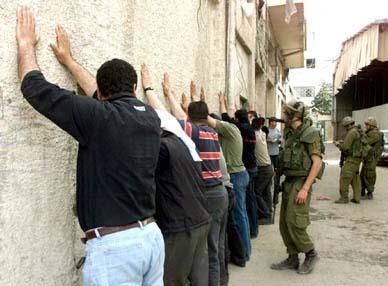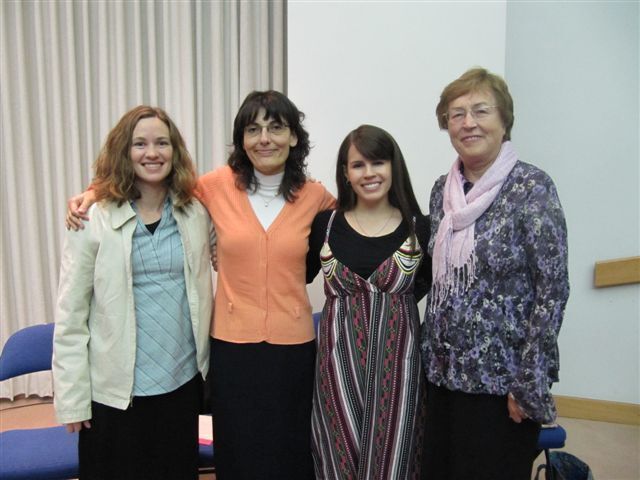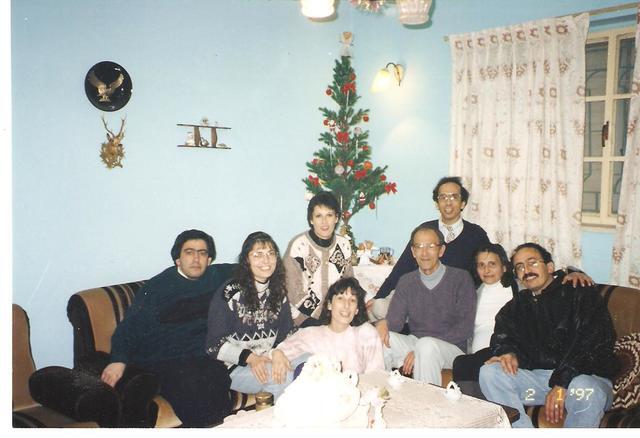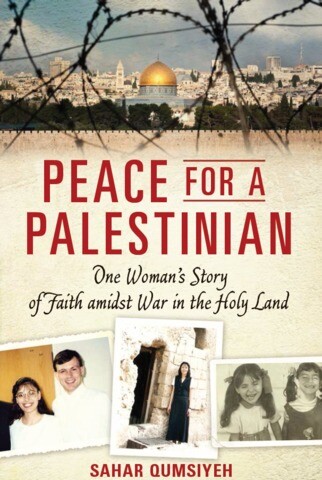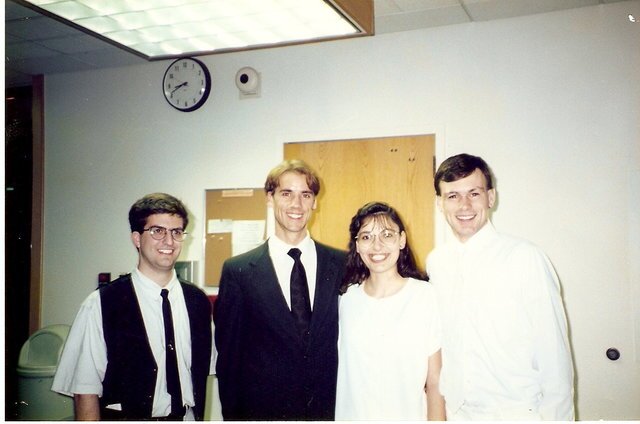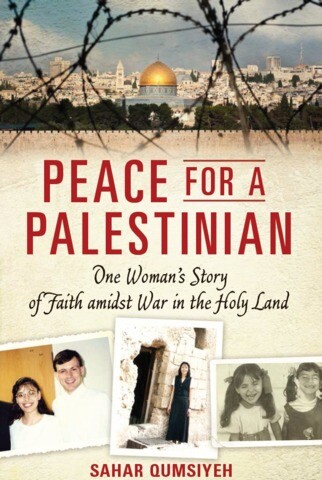“Go home! You can’t enter Jerusalem! Go back!” the soldier at the checkpoint screamed at me. This soldier who had invaded my country was now telling me that I was denied access to the city of my birth. I tried to form angry words to respond to his unjust act but was halted by the words of the Savior echoing in my ear: “Love your enemies.”
Memories flashed through my mind of times when I had seen these soldiers demolish homes of my relatives, beat people until their bones were broken, arrest family members, and prevent me from going to church in Jerusalem and partaking of the sacrament. Images came to my mind of those soldiers invading my sister’s home in the middle of the night, terrorizing her children, and arresting her husband and keeping him in jail with no charge for months.
Another distinct picture then formed in my mind. This picture was of Isaac, a fellow student at Bethlehem University. I saw him right after he was shot by an Israeli soldier. I saw the bullet hole in his head. All of a sudden, I was again able to smell the tear gas in the air and feel the sad atmosphere at the university that day in 1987.
Anger and hate filled my soul, and I thought, How could the Lord expect me to love these soldiers? Is that even possible? After what I have seen some of the soldiers do, He could not possibly expect me to love them! The words came again, now more real to my mind: “Love your enemies.” The Lord’s voice was clearly directed at me.
I am a Palestinian Arab. I was born and raised in Palestine, a place of constant conflict.
When I graduated from high school in 1987, the Intifada (the term Palestinians use for “uprising”) started. Young Palestinians went into the streets to protest against the Israeli occupation.
Anton was one of those young men. He was attending Bethlehem University at the same time I was, and he was my cousin’s classmate at the university. Anton was killed by rubber bullets that were shot into his body by an Israeli soldier. A magazine report describes what happened:
“As Anton left a steep path that ran down into a street leading to his house, he was stopped by the two border policemen and shoved against the wall of a neighboring house with his hands raised. Two women eyewitnesses, one at her door a few yards away and another on a balcony across the street, saw one of the policemen thrust his automatic weapon into the young man’s back and fire three rounds of rubber bullets into Anton’s body. The Makassed Hospital report . . . described extensive injuries causing massive internal bleeding, the blood eventually flooding the lungs. X-rays revealed square-shaped bullets in Anton’s body, the rubber thinly coating their metal cores.
“Seizing Anton, who weighed only about 130 pounds, the Israeli border policemen dragged him down a flight of stone steps to a concealed balcony adjoining the house below. Without calling for an ambulance or medical help they then disappeared, leaving him bleeding to death. Later a small private car took Anton to Jerusalem, where doctors struggled in vain to save his life.” (Washington Report on Middle East Affairs, July 1992, 38, 87)
After Anton was killed, we walked in a demonstration protesting his murder.
Read more of Sahar's remarkable story in Peace for a Palestinian:One Woman's Story of Faith Amidst War in the Holy Land.
Sahar Qumsiyeh was born into a loving Christian family in Jerusalem and raised in Beit Sahour, near Bethlehem. Growing up in a country torn apart by political upheaval, Sahar struggled with feelings of hopelessness and anger as she watched her people being persecuted, tormented, and even killed.
In Peace for a Palestinian, Sahar shares her experience desperately searching for peace and joy only to find that true peace lies not in external resolution but in following the Savior. As she explains, "We may live in a place with barriers, checkpoints, and restrictions, but we can feel liberated by His Atonement."
Gathering Darkness
At the time when the first uprising started, I was not interested in politics, so I kept myself distant from these demonstrations. However, what happened on October 29, 1987, changed all that. The events of that day are forever engraved in my mind.
I began attending Bethlehem University that fall. I was 16 years old and oblivious to the various political ideologies around me. The day began with me attending my classes just like any other day. It was late morning when some of my fellow students organized a demonstration on campus. Students carried protest signs and shouted against the Israeli occupation. Some of them gathered rocks to throw at the Israeli soldiers when they arrived.
The university gates were closed to prevent direct clashes and serious injuries to the students. Bethlehem University is surrounded by a 10-foot wall, making it difficult to get in and out when the gate is closed. A few students inside the walls threw stones at the soldiers stationed outside the walls. In return, the soldiers fired tear gas bombs at those students. Along with many other students, I waited inside one of the buildings instead of participating.
Shortly after the exchange with the soldiers began, we saw students being carried into the clinic. At first their injuries were related to the tear gas. Some had passed out, and others were very dizzy. But then we noted students with bullet wounds being admitted. We watched as more injured students were carried into the clinic. Blood dripped on the floors of our science department.
A few hours later we saw people bring in another injured student, Isaac. Two people were holding his legs and two others were holding his arms as they rushed him to the clinic. The hallway was silent, and all eyes were fixed on that student with the dark complexion who seemed, unlike the others who had been brought in, not to be moving.
This injury was different, and everyone knew it. Isaac’s wound was in his head, and the clinic personnel could do nothing to help him. We heard that Isaac had been on the roof of the cafeteria hanging a Palestinian flag when an Israeli soldier shot him in the head. We all waited with anticipation—we expected Isaac to be rushed to a hospital. But he was not. The soldiers would not allow him or anyone else to leave the campus. We sat there for two hours as Isaac fought for his life. Everyone was silent. Suddenly nothing else mattered. Isaac was slowly dying.
The mayor of Bethlehem spoke to the soldiers, and they finally allowed Isaac to be taken to a hospital. The doctor rolled him away down the hallway as we all lined up on either side. Isaac looked as if he were asleep, even smiling, from one side of his face, but from the other side, where the large hole in his head was visible, he looked dead. After Isaac was rolled away, the students in unison started singing patriotic songs. I felt power and consolation in the words to one of the songs: “It is all right if we die, if we will root out death from our land.”
What happened at the university that day changed my life forever. Isaac, who was the oldest child in his family, was a senior majoring in English literature. His parents had been unable to find work and were anxiously awaiting Isaac’s graduation so he could work to support the family. When soldiers took Isaac away from the hospital in Bethlehem only a short time after he was admitted, we did not know whether he was alive or dead. We later learned that his body was taken to an Israeli hospital, where many of his organs were transplanted into Israeli patients. At midnight, soldiers brought Isaac’s lifeless and empty body to his home in the Aida Refugee Camp and allowed only his parents to accompany their transport of the body to a remote field far from Bethlehem. We heard that soldiers dug a hole and threw Isaac’s body inside and then covered the hole with rocks and dirt. I can’t imagine how Isaac’s parents felt that night as they saw their beloved son’s body being desecrated so horribly.
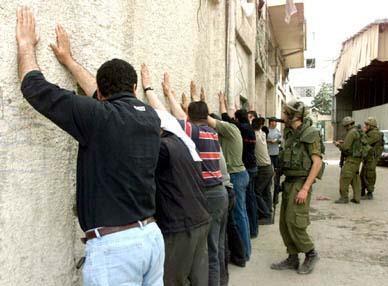
Men lined up before Israeli soldiers. All images courtesy of Sahar Qumsiyeh.
By Israeli military order, Bethlehem University was closed following the events of that day and remained closed for two years. For a long time afterward, I sat in my room contemplating what had happened. I tried to understand why the Israeli soldiers would do something like that. What they did to Isaac seemed inhuman. I allowed hate and anger to linger in my heart. As I watched people in my town get arrested or beaten or shot, I wondered why God had abandoned me and my people.
Aside from the occasional demonstrations, I sat in my room and thought about my situation. It seemed hopeless. My university was closed, as were all the other Palestinian universities. I felt my heart fill with the darkness of anger and hate. I longed to die. In fact, during some demonstrations, everyone else ran from the Israeli soldiers while I stood still. I thought death was the only way to end my misery, because I saw no hope in the future. I began to pray to Heavenly Father, asking Him to end my life. One day I prayed with such intensity and faith that I thought He must have heard me.
Read more of Sahar's remarkable story in Peace for a Palestinian: One Woman's Story of Faith Amidst War in the Holy Land.
Sahar Qumsiyeh was born into a loving Christian family in Jerusalem and raised in Beit Sahour, near Bethlehem. Growing up in a country torn apart by political upheaval, Sahar struggled with feelings of hopelessness and anger as she watched her people being persecuted, tormented, and even killed.
In Peace for a Palestinian, Sahar shares her experience desperately searching for peace and joy only to find that true peace lies not in external resolution but in following the Savior. As she explains, "We may live in a place with barriers, checkpoints, and restrictions, but we can feel liberated by His Atonement."
Rekindling Hope
I graduated in 1993 with a bachelor’s degree in mathematics and started teaching at an elementary school. I soon discovered that teaching elementary school was not something I wanted to do for the rest of my life.
My brother Maher suggested that I get a master’s degree in statistics. Because getting a master’s degree in my country was not possible, I planned to go to the United States to obtain my degree. However, the salary I made then (about $400 a month) did not enable me to have any savings. There was no way that I could afford to pay for an education in the United States, so I pursued scholarships at several American universities.
I was overjoyed to receive an acceptance and a scholarship to American University in Washington, D.C. The scholarship was very generous, totaling $56,000 a year to cover all my schooling and living costs. The thought of leaving the violence, confusion, and hopelessness in Palestine to study in the United States thrilled me.
When I received a phone call soon afterward from a man saying, “Congratulations, you have been granted a scholarship to Brigham Young University,” I was understandably silent. Should I tell him that I am not interested, or should I wait and tell him later? I thought. Even though I had applied for a BYU scholarship after seeing an ad in the Al-Quds local newspaper, I never intended to go to BYU.
My mother mocked me for even applying. She said Utah was in the middle of nowhere and was a desert. I began making some inquiries and discovered that Mormons, or members of The Church of Jesus Christ of Latter-day Saints, lived in Utah. I had absolutely no idea what Mormons believed, but I had heard rumors from family members and friends about some strange beliefs they held.
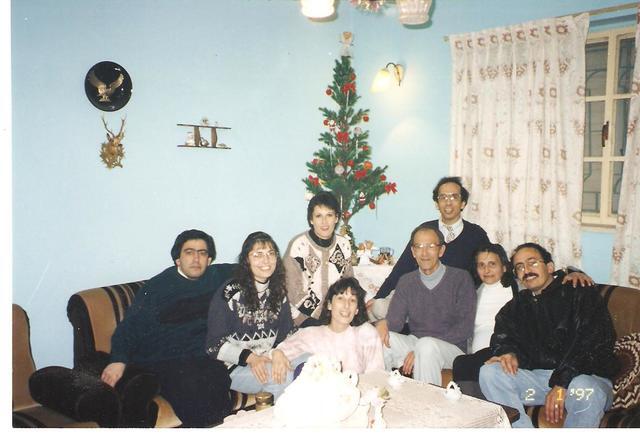
Sahar Qumsiyeh with her family
Later I discovered that the BYU scholarship amounted to only $10,000 a year, less than one-fifth of my scholarship to American University. I had a decision to make, though the decision appeared to be easy because it was such an obvious choice. Without warning or explanation, however, I began to feel a yearning in my heart to go to BYU.
For the first time when faced with making a choice, I decided to ask Heavenly Father for help. Up to this point in my life, my prayers had often been rote, meaningless, and not particularly sincere. The few occasions when I had prayed from my heart were during the hardest times I had ever experienced—when I had asked Heavenly Father to end my life.
After this particular prayer, however, I had this strong feeling in my heart—a feeling I could not deny—saying that I should go to BYU. I did not identify that feeling as coming from the Holy Ghost, but I simply could not shake it. I followed my feelings and committed to pursue my graduate degree in statistics at BYU.
During my first year at BYU, I had the chance to listen to part of the general conference of the LDS Church. At first I listened because I was curious about the idea of a prophet speaking. I don’t remember much at all of what was said in conference, but I sat up and took note when I heard a speaker refer to my land as “Palestine” rather than calling it “Israel,” as most Americans did. This was the first time I had heard any American express what sounded like support for the Palestinians, and I thought a church that did not hate Palestinians must be a good church.
After that session of conference was over, I asked my friend Shae to tell me about her church. Shae told me everything. She started with the Creation of Adam and Eve and the Fall from the Garden of Eden and explained how God has a purpose for our lives in this fallen world. She told me about the plan Heavenly Father has for His children, about the Atonement of Jesus Christ, the Apostasy, and the Restoration of the gospel. It was as though Shae were putting all the pieces of a puzzle together, and for the first time I could finally see the beautiful picture—a picture that was so clear and cohesive.
Soon after Shae’s illuminating explanation, Bryce, a friend of mine from class, gave me a copy of the Book of Mormon that had been translated into Arabic.
In the summer of 1995, I finished reading the Book of Mormon. But I never needed to kneel down to ask Heavenly Father if the book was true or if The Church of Jesus Christ of Latter-day Saints was the true church of God. I already knew the answer deep in my heart and with every fiber of my being. Words simply cannot describe my feelings during this time of study and pondering. For the first time in my life, I experienced a sensation of profound peace—peace and remarkable joy. I wrote in my journal, “I didn’t think that such peace and joy were possible!”
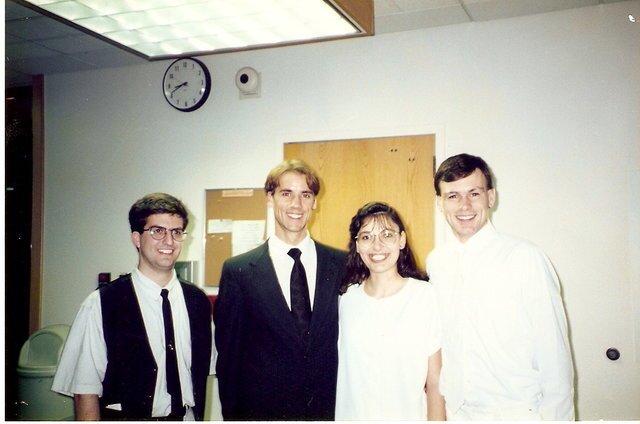
Sahar Qumsiyeh at her baptism
With excitement but also plenty of trepidation, I called my father and mother to tell them that I had decided to be baptized a member of the Church. I don’t think I was prepared for their emotional reaction. They were so mad at me that they called me crazy and brainwashed. My mother said that if I did join the Church, I would never marry, everyone would avoid me, and our family’s reputation would be ruined. When I thought of the fallout that would occur if I were baptized, my heart broke.
Soon I could fight my feelings no longer. On February 4, 1996, I was finally baptized.
Read more of Sahar's remarkable story in Peace for a Palestinian:One Woman's Story of Faith Amidst War in the Holy Land.
Sahar Qumsiyeh was born into a loving Christian family in Jerusalem and raised in Beit Sahour, near Bethlehem. Growing up in a country torn apart by political upheaval, Sahar struggled with feelings of hopelessness and anger as she watched her people being persecuted, tormented, and even killed.
In Peace for a Palestinian, Sahar shares her experience desperately searching for peace and joy only to find that true peace lies not in external resolution but in following the Savior. As she explains, "We may live in a place with barriers, checkpoints, and restrictions, but we can feel liberated by His Atonement."
Finding Peace
Jerusalem, the city of my birth, means “City of Peace.” My parents were actually going to call me Salam, which means “peace” in Arabic. Instead, I was given the name Sahar, which means “awakening” or “dawn” (the end of the night and the first ray of sun). Peace was a feeling that was foreign to me and that I grew up wondering about. I had heard many speak about it, but for the first 24 years of my life, I didn’t know what peace was.
My young life overflowed with sounds of rifles, long days of curfew, the agony of smelling tear gas, house demolitions, arrests, and injustices. I shivered in fear one day as my friends and I hid behind a fence when an Israeli settler got out of her car and started shooting at us. I hated guns and the sound of gunshots. There was pain every time I heard that sound, and I heard it often.
I remember being awakened in the middle of the night as a young girl to hear that my neighbors’ house was about to be demolished by the Israeli soldiers. My neighbors’ son had been caught in a demonstration against the occupation. Demolishing his house was the punishment. Our family and other neighbors gathered to give support to this family, even though the time was approaching midnight. The soldiers knocked at their door and gave them only a few minutes to take out a few belongings before blasting down their two-story house, leaving them homeless. Shock and disbelief covered their faces as they quickly piled their belongings in the yard. What would I have taken if I was given only minutes to gather my things? I thought.
The conflict and war was right at our doorstep, and everyone seemed affected by it. Through all this, I wondered, What is peace? And where does someone find it?
I grew up right next to the birthplace of the Savior. I often saw the places where He was raised, where He suffered, and where He died. I could not understand why the Savior chose my country to be born in. He is the Creator of the world and could have chosen any city and any country to be born in. Why did He choose my country? Palestine seemed to be a place of conflict all the time. Why would someone referred to as the Prince of Peace choose to be born in Palestine, a place of constant conflict and war?
I was raised in a town where, two thousand years ago, angels appeared to shepherds to inform them that their Savior had been born in Bethlehem. That initial message from the angel to the shepherds was followed by a multitude of heavenly hosts praising God: “Glory to God in the highest, and on earth peace, good will toward men” (Luke 2:14; emphasis added). Peace on earth? But peace surely did not seem to exist in my country. So what is this peace the angels were referring to?
I discovered the answer to this question when I began investigating the Church. After I repented of my sins and started obeying the commandments, I started experiencing peace. This was a strange feeling to me, something I had never before experienced. It was a simple feeling that developed within me as I changed my heart, repented of my sins, and followed Jesus Christ. It was a warm feeling that engulfed my heart and soul, comforted me, and brought deep joy. It was a feeling that brought nourishment to a soul that had been hungry for years. Peace came into my life the minute I decided to walk in the footsteps of the Prince of Peace. Right after I joined the Church, I wrote in my journal: “My country has never experienced peace, but now I feel my heart has enough peace to cover the entire country of Palestine and to cover all the pain and suffering of my people.”
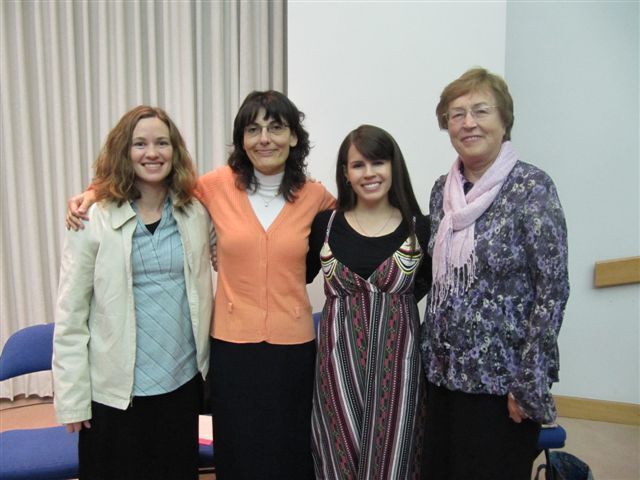
Sahar Qumsiyeh with Church members
I have come to realize that one of the reasons Christ was born in a place of conflict and constant war is to show us that real peace can come only through Him. The peace He offers is a kind of peace that is not dependent on the situation around us. It is not “as the world” would offer. The Prince of Peace has the power to stop wars and conflicts and to bring physical peace, but sometimes what is even more amazing is that He can and does provide internal peace to people living in difficult situations.
I testify that the Savior is the Prince of Peace. He is the only source of true peace and light in this dark world. If we come unto Him, we will find a joy and peace that we have never before experienced. If we turn our lives to Him and allow Him to be in charge of our lives, He will walk with us and often carry us back to His mansions above. I testify that the more obedient I have been, the happier I have felt. The blessings I have received through my obedience were feelings of comfort, peace, and joy. Although oftentimes our obedience will not bring us relief from trials, it does bring blessings and internal peace. Of this I bear witness.
Read more of Sahar's remarkable story in Peace for a Palestinian:One Woman's Story of Faith Amidst War in the Holy Land.
Sahar Qumsiyeh was born into a loving Christian family in Jerusalem and raised in Beit Sahour, near Bethlehem. Growing up in a country torn apart by political upheaval, Sahar struggled with feelings of hopelessness and anger as she watched her people being persecuted, tormented, and even killed.
In Peace for a Palestinian, Sahar shares her experience desperately searching for peace and joy only to find that true peace lies not in external resolution but in following the Savior. As she explains, "We may live in a place with barriers, checkpoints, and restrictions, but we can feel liberated by His Atonement."
